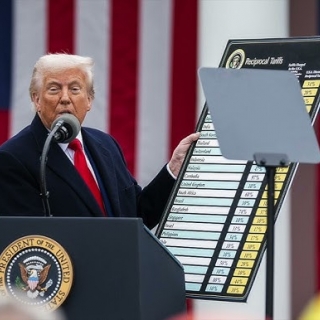


President Donald Trump said on Monday most trading partners that do not negotiate separate trade deals would soon face tariffs of 15% to 20% on their exports to the United States, well above the broad 10% tariff he imposed in April.
Trump told reporters his administration will notify some 200 countries soon of their new "world tariff" rate.
"I would say it'll be somewhere in the 15 to 20% range," Trump told reporters, sitting alongside British Prime Minister Keir Starmer at his luxury golf resort in Turnberry, Scotland. "Probably one of those two numbers."
Trump, who has vowed to end decades of U.S. trade deficits by imposing tariffs on nearly all trading partners, has already announced higher rates of up to 50% on some countries, including Brazil, starting on Friday.
The announcements have spurred feverish negotiations by a host of countries seeking lower tariff rates, including India, Pakistan, Canada, and Thailand, among others.
The U.S. president on Sunday clinched a huge trade deal with the European Union that includes a 15% tariff on most EU goods, $600 billion of investments in the U.S. by European firms, and $750 billion in energy purchases over the next three years.
That followed a $550-billion deal with Japan last week and smaller agreements with Britain, Indonesia, and Vietnam. Other talks are ongoing, including with India, but prospects have dimmed for many more agreements before Friday, Trump's deadline for deals before higher rates take effect.
Trump has repeatedly said he favors straightforward tariff rates over complex negotiations.
"We're going to be setting a tariff for essentially, the rest of the world," he said again on Monday. "And that's what they're going to pay if they want to do business in the United States. Because you can't sit down and make 200 deals."
Canadian Prime Minister Mark Carney said on Monday trade talks with the U.S. were at an intense phase, conceding that his country was still hoping to walk away with a tariff rate below the 35% announced by Trump on some Canadian imports.
Carney conceded this month that Canada - which sends 75% of its exports to the United States - would likely have to accept some tariffs
Source: Investing.com
US bonds fell after jobless claims fell to their lowest level since 2022, one of the last readings on the health of the US labor market before the Federal Reserve's interest rate decision next week. ...
According to a report from the US Department of Labour (DOL) released on Thursday, the number of US citizens submitting new applications for unemployment insurance went down to 191K for the week endin...
Treasury Secretary Scott Bessent on Wednesday predicted that the administration still will be able to implement its tariff agenda regardless of whether it prevails in a pending case before the Supreme...
Private businesses in the US cut 32K jobs in November 2025, following an upwardly revised 47K gain in October, and compared to forecasts of a 10K rise. Hiring was particularly weak in manufacturing (...
Ekonom terkenal Scott Bessent memprediksi bahwa Amerika Serikat kemungkinan akan mengalami pertumbuhan ekonomi yang kuat namun inflasi tetap rendah pada 2026. Menurut Bessent, faktor seperti harga ene...
US stocks closed higher on Friday (December 5), with the S&P 500 up 0.2%, the Nasdaq up 0.4%, and the Dow Jones Industrial Average up 0.2% as weak PCE data and positive sentiment in Michigan strengthened the likelihood of a 25bps Fed rate cut...
Oil prices edged up nearly 1% to a two-week high on Friday (December 5th) amid growing expectations that the US Federal Reserve will cut interest rates next week, which could boost economic growth and energy demand, as well as geopolitical...
Gold closed around $4,210 an ounce on Friday, near its highest level since late October, paring an earlier rally as a series of US data strengthened the case for an imminent Fed rate cut. Delayed September PCE rose 0.3% month-on-month and 2.8%...
 Private businesses in the US cut 32K jobs in November 2025, following an upwardly revised 47K gain in October, and compared to forecasts of a 10K...
Private businesses in the US cut 32K jobs in November 2025, following an upwardly revised 47K gain in October, and compared to forecasts of a 10K...
 Asia-Pacific stock markets opened lower on Friday, following the sluggish sentiment on Wall Street. In Australia, the ASX/S&P 200 fell 0.17%. In...
Asia-Pacific stock markets opened lower on Friday, following the sluggish sentiment on Wall Street. In Australia, the ASX/S&P 200 fell 0.17%. In...
 European stocks closed higher on Thursday (December 2nd), supported by a rebound in shares of major banks and automakers. The Eurozone STOXX 50 and...
European stocks closed higher on Thursday (December 2nd), supported by a rebound in shares of major banks and automakers. The Eurozone STOXX 50 and...
 Ekonom terkenal Scott Bessent memprediksi bahwa Amerika Serikat kemungkinan akan mengalami pertumbuhan ekonomi yang kuat namun inflasi tetap rendah...
Ekonom terkenal Scott Bessent memprediksi bahwa Amerika Serikat kemungkinan akan mengalami pertumbuhan ekonomi yang kuat namun inflasi tetap rendah...